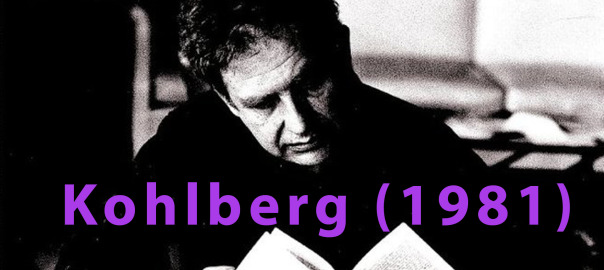Kohlberg (1981) – The Philosophy of Moral Development, New York: Harper and Row
Background
This study is the second we look at the cognition section from Turning to Crime. It is further categorised into ‘Moral development and crime.’
The background to this research is Freud’s theory of development, which Kohlberg extended.
Freud believed that when children are born they only have the ID present, which means they are egocentric and do not care about anyone else but themselves. Later, the ego and the superego develop which allow people to understand morality.
Watch this video before proceeding:
The Heinz Dilemma is also part of the background to this study.
It is highly recommended that you read: Moral Development: Guide to Piaget and Kohlberg in order to gain a full understanding of this theory.
Theory
There are 3 levels and and 6 levels to Kohlberg’s theory.
Level 1 – Pre-conventional Morality:
- Stage 1: Punishment-avoidance and obedience – individuals only follow rules if it prevents punishment or if they can get away with it.
- Stage 2: Exchange of favours – Individuals begin to understand that they can do things to gain other things they want.
Level 2 – Conventional Morality:
- Stage 3: Good boy/girl – individuals make moral decisions on the basis of what actions will please others especially authority figures.
- Stage 4: Law and order – Individuals now look to society as a whole for guidelines concerning right and wrong.
Level 3 – Post-conventional Morality:
- Stage 5: Social Contract: Individuals recognise that the rules represent an agreement among many people about appropriate behaviour. This they understand that rules can be transcended if the situation requires.
- Stage 6: The Universal Ethical Principle Orientation: Individuals adhere to a small number of abstract, universal principles that transcend specific concrete rules. They answer to an inner conscience and may break rules that violate their own ethical principles. – Very few, if any, reach this stage.
Aim
To find evidence in support of a progression through stages of moral development.
Method
The study stared in 1963.
Longitudinal study with interviews with 58 working and middle class boys from Chicago, aged 7, 10, 13 and 16
The boys were interviewed individually for 2 hours each time, they were interviewed every 3 years until they were 30-36 years old. Although the rate of subject attrition is not know, we can assume some participants did not return.
Results
The younger and youngest boys tended to be in either stage 1 or stage 2 of the moral development theory. Whereas, older boys were typically in stage 3 or 4.
No support was found for stage 6.
Conclusions
Although Kohlberg’s theory was not intended to apply to criminal morality, a replication of this study, (Thornton and Reid, 1982) suggested that criminals who commit crime for financial gain tend to display more immature morality than those who commit more violent crimes.
Evaluation
The sample is both ethnocentric and androcentric, therefore is is not very generalisable.
Given the study is longitudinal it is low in replicability, however it does show development over time, which is very important for this study.
It could be argued the study contains temporal bias as it begun in 1963, it may not be generalisable to the moral development of today’s children.
Audio Podcast
References
Duska, P.hd R, F, 1975. Moral Development: Guide to Piaget and Kohlberg. 1st ed. Mahwah, NJ: Paulist Press.
Further Reading
Moral Development: Guide to Piaget and Kohlberg

Hello, I would just like to say thank you for these revision materials. Also in the Kohlberg study of moral development, I was just wondering if when it says the study is influenced by the Freud’s theory of development, shouldn’t it be piaget’s? Thank you again.
Hello,
Thank you for your comments.
The aim of this section of the website is to simplify all the materials for the A2 G543 Psychology exam. You’re right that Piaget should be included here. However, Kohlberg was also influenced by Freud’s theory of development, which is simpler. In the exam, if the question requires material beyond Kohlberg’s theory, then you can use Freud and Piaget to contextualise the theory.
Thanks